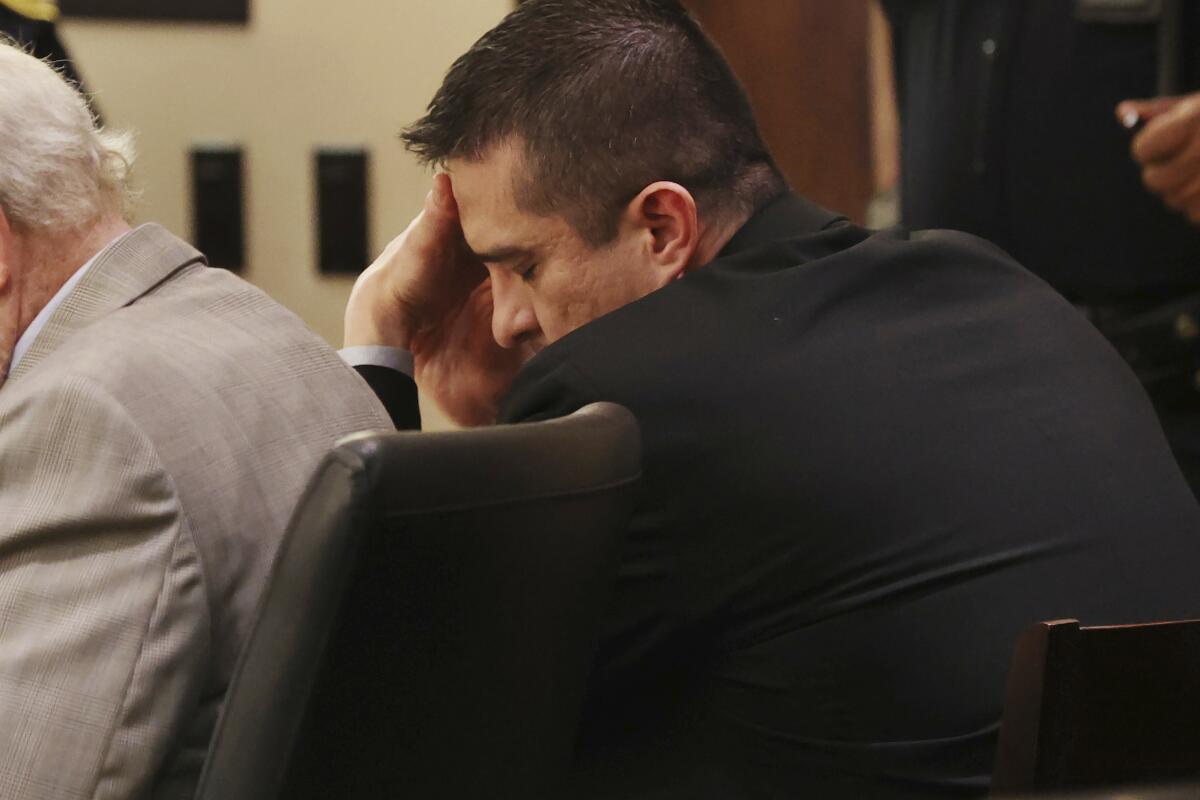Former U.S. Border Patrol agent convicted of murdering 4 women in Texas

SAN ANTONIO — A former Border Patrol agent who confessed to killing four sex workers in 2018 was convicted Wednesday of capital murder after jurors heard recordings of him telling investigators that he was trying to “clean up the streets” of his south Texas hometown.
Juan David Ortiz, 39, received an automatic sentence of life in prison without the possibility of parole because prosecutors decided not to seek the death penalty.
Ortiz, a Border Patrol intelligence supervisor at the time of his arrest, was accused of killing Melissa Ramirez, 29; Claudine Anne Luera, 42; Guiselda Alicia Cantu, 35; and Janelle Ortiz, 28. Their bodies were found along roads near Laredo, Texas, in September 2018.
During the trial, which began last week, jurors heard the defendant’s confession during a lengthy taped interview with investigators.
Ortiz told investigators that he had been a customer of most of the women, but he also expressed disdain for sex workers, referring to them as “trash” and “so dirty” and saying that he wanted to “clean up the streets.” He said “the monster would come out” as he drove along a stretch of street in Laredo frequented by the women.
A U.S. official says the tractor-trailer involved in a human-smuggling attempt that left 53 people dead had passed through an inland U.S. Border Patrol checkpoint with migrants inside earlier in its journey.
After the verdict, family members of the victims faced Ortiz to give their statements. Ramirez’s sister-in-law, Gracie Perez, said she was “a loving, kind and funny person.” She told Ortiz that the hearts of Ramirez’s children are now broken.
“Do you know how much pain you have caused this family?” Perez said. “My heart is torn apart knowing that I won’t be able to see her but to visit her in the cemetery.”
Defense attorneys said that Ortiz was improperly induced to make the confession and that it should not be considered. Defense attorney Joel Perez argued that Ortiz, a Navy veteran who had been deployed to Iraq, was suffering from post-traumatic stress disorder, insomnia, nightmares and headaches, and was medicated and had been drinking on the night of his confession.
Prosecutors told jurors it was a legal confession provided by an educated senior law enforcement official who was not having a mental breakdown.
The Biden administration’s move ensures that Haitians who have been in the country as of Nov. 6 this year will be eligible to apply for temporary protected status.
Erika Pena testified that Ortiz picked her up on the evening of Sept. 14, 2018, and that she got a bad feeling when he told her he was the “next to last person” to have sex with Ramirez, whose body had been found a week earlier. She testified that he told her he was worried investigators would find his DNA on the body.
“It made me think that he was the one who might have been murdering,” Pena, 31, told the jury. She escaped from his truck at a gas station after he pointed a gun at her, and she ran straight to a state trooper who was refueling his vehicle. Ortiz fled.
Authorities tracked Ortiz to a hotel parking garage in the early hours of Sept. 15, 2018, and he was arrested.
Breaking News
Get breaking news, investigations, analysis and more signature journalism from the Los Angeles Times in your inbox.
You may occasionally receive promotional content from the Los Angeles Times.
Capt. Federico Calderon of the Webb County Sheriff’s Department testified that officers who arrested Ortiz knew about the slayings of Ramirez and Luera and, while chasing him after Pena’s escape, learned that a third body — later identified as Cantu’s — had been found. But Calderon said it wasn’t until Ortiz’s confession that they learned Janelle Ortiz had been slain.
Webb County Medical Examiner Corinne Stern testified that Ramirez, Luera and Janelle Ortiz were fatally shot. Cantu, who was shot in the neck, died of blunt force trauma to the head.
The bullets collected from the crime scenes came from the same gun and matched the weapon found in Juan David Ortiz’s pickup, a ballistics expert testified.
Ortiz served in the U.S. Navy for nearly eight years, until 2009, holding a variety of medical posts, and served a three-year detachment with the Marines.
More to Read
Sign up for Essential California
The most important California stories and recommendations in your inbox every morning.
You may occasionally receive promotional content from the Los Angeles Times.












